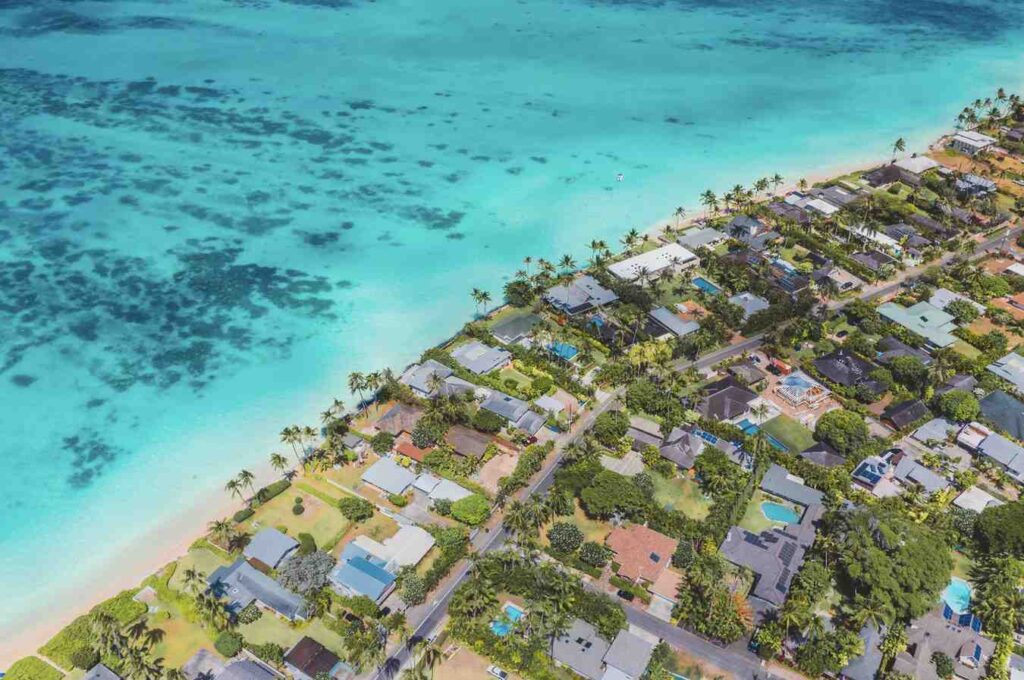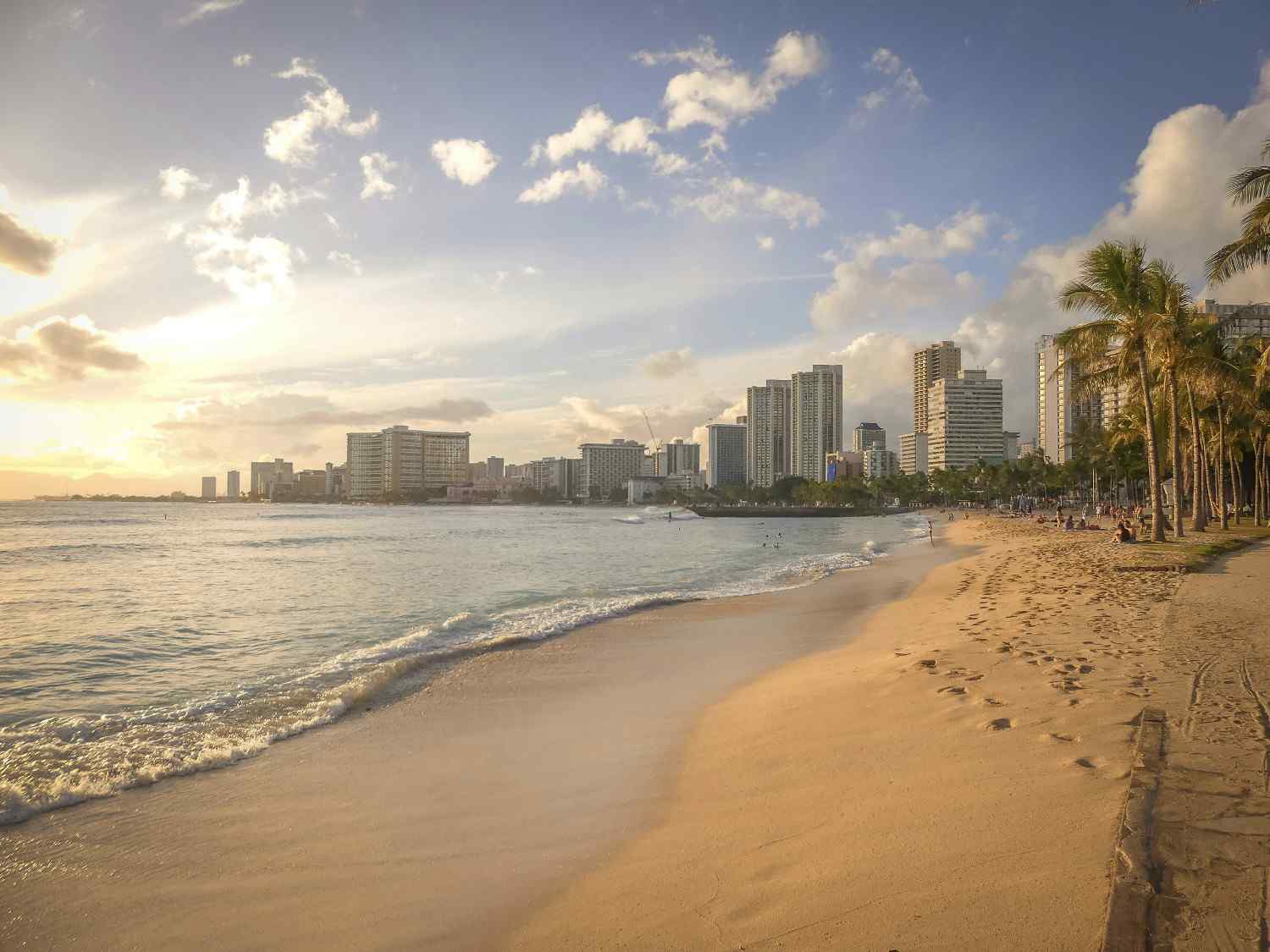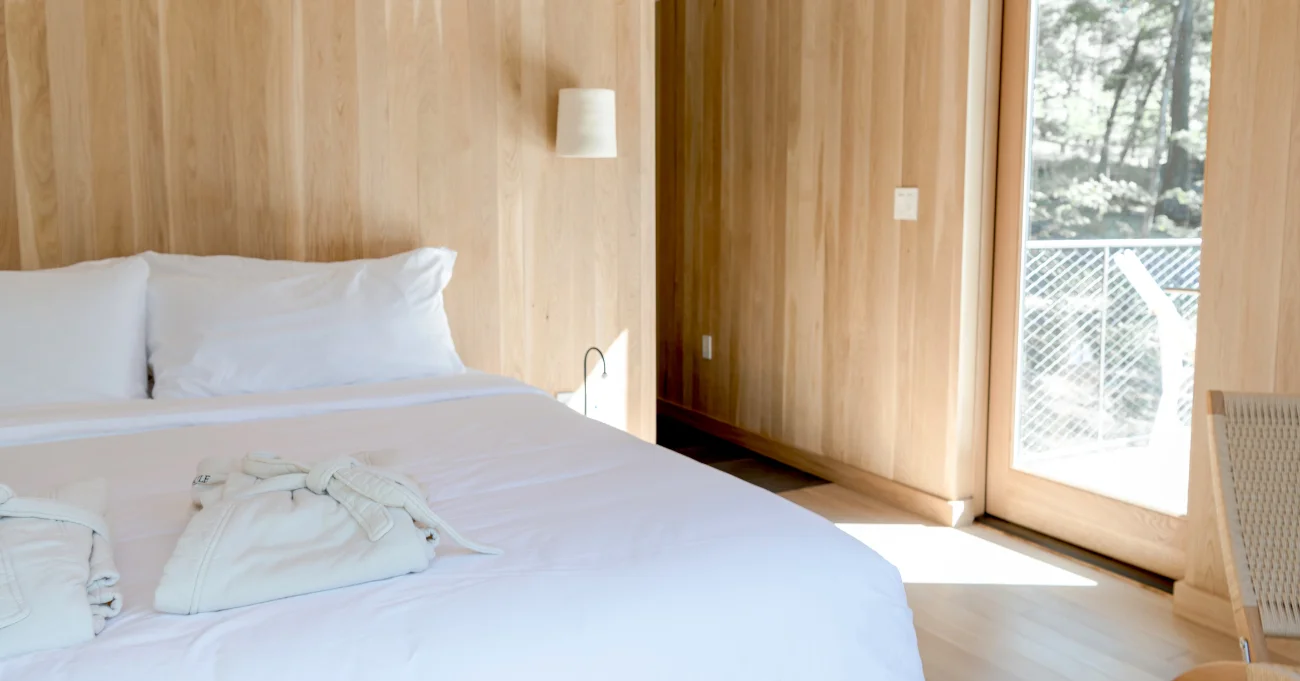Vacation homes in Hawaiii are everyone’s dream: palm trees, warm weather, and a laid-back vibe.
Financing, on the other hand, is a whole other problem. With median values currently hovering near the $1M mark, it can be very difficult to buy a vacation home in Hawaii.
Luckily for you, we here at Defy Mortgage have a complete and detailed guide featuring the most up-to-date financing options and market insights for the Hawaiian islands.
Hawaii’s real estate market has always commanded premium prices due to its limited land availability and unmatched natural beauty. As of March 2025, homes in Hawaii have experienced a 1.2% increase in property values, maintaining its position as one of the most exclusive real estate markets in the United States.
When you’re looking to purchase a vacation home or investment property in Hawaii, understanding your financing options becomes crucial to your success—especially since traditional financing may not always be the best fit. This comprehensive guide explores vacation home financing in Hawaii with special attention to non-QM loan solutions for 2025.
Why Non-QM Loans Are Ideal for Hawaii Vacation Home Buyers
Traditional qualified mortgage (QM) loans follow strict guidelines set by government agencies. However, many vacation home buyers in Hawaii find themselves in unique financial situations that don’t fit neatly into conventional lending boxes. This is where non-QM loans shine.
Non-QM loans offer flexibility for:
- Self-employed individuals with complex income structures
- Foreign nationals looking to own a piece of paradise
- Investors building a portfolio of vacation rental properties
- High-net-worth individuals with non-traditional income sources
- Buyers seeking interest-only payment options to maximize cash flow

As Hawaii’s vacation home market continues to attract diverse buyers, non-QM financing has become an essential pathway to ownership for many.
2025 Hawaii Real Estate Market Overview by Island
Hawaii’s vacation home market varies significantly by island. Here’s the latest market breakdown:
| Island | Median Home Price | YoY Change | Vacation Rental Demand |
| Oahu | $1,100,000 | +9% | High |
| Maui | $1,250,000 | +18.8% | Very High |
| Kauai | $968,000 | +1.2% | Very High |
| Big Island | $867,000 | +3.1% | High |
These prices reflect the premium nature of Hawaii’s real estate market and showcase why flexible financing solutions are often necessary for vacation home purchases.
Key Hawaii Markets for Vacation Home Buyers
Let’s explore specific markets where non-QM loans are particularly relevant and examine the unique characteristics of each:
1. Maui
Avg Vacation Home Price: $1,250,000
Vacation Rental Potential: Excellent
When You Might Need a Non-QM Loan: Maui’s premium vacation property market often exceeds conventional loan limits. Properties in desirable areas like Wailea and Kaanapali frequently command prices that require jumbo or non-QM financing solutions.
Premium Neighborhoods:
- Wailea – Luxury condos and homes with golf course and ocean views
- Kaanapali – Beachfront condos and resort-style living
- Kapalua – Exclusive resort community with championship golf courses
- Lahaina – Historic charm with ocean-view properties
Maui’s vacation rental regulations continue to be strict but well-defined, making it attractive for investors who understand the rules. Non-QM loan products with debt service coverage ratio (DSCR) qualifications are particularly popular, as they qualify borrowers based on the property’s income potential rather than their personal income.
2. Kauai
Avg Vacation Home Price: $968,000
Vacation Rental Potential: Very Good
When You Might Need a Non-QM Loan: Kauai’s strict vacation rental regulations make certain areas more valuable for vacation ownership. Properties in designated tourist zones command premium prices and often need specialized financing.
Premium Neighborhoods:
- Princeville – Luxury homes and condos on the North Shore
- Poipu – Sunny South Shore properties with excellent rental potential
- Hanalei – Exclusive beachfront and near-beach properties
- Koloa – Historic charm with modern vacation amenities
Kauai’s vacation rental zoning is highly specific, with certain areas zoned for transient vacation rentals (TVRs) commanding significant premiums. Non-QM loans with flexible income verification and asset utilization features are particularly valuable for buyers targeting these specialized properties.
3. Oahu
Avg Vacation Home Price: $1,100,000
Vacation Rental Potential: Good (in designated areas)
When You Might Need a Non-QM Loan: Oahu has the strictest vacation rental regulations of all Hawaiian islands, making properties in legal vacation rental zones extremely valuable. These properties often exceed conventional loan limits and may require non-QM solutions.
Premium Neighborhoods:
- Waikiki – Luxury condos with hotel-like amenities
- Ko Olina – Resort-style living with lagoon access
- North Shore – Surfing paradise with premium beachfront properties
Oahu’s vacation rental regulations make legally-zoned vacation rental properties rare and valuable. For investors seeking these properties, non-QM loans with interest-only options and alternative income qualification methods provide essential flexibility.
4. Big Island (Hawaii Island)
Avg Vacation Home Price: $867,000
Vacation Rental Potential: Excellent (varies by district)
When You Might Need a Non-QM Loan: The Big Island offers the most affordable vacation home prices in Hawaii, though premium properties still often exceed conventional loan limits. The island’s vacation rental regulations vary by district, making certain areas particularly valuable for investment.
Premium Neighborhoods:
- Kohala Coast – Luxury resort communities and golf properties
- Kailua-Kona – Ocean-view condos and homes with excellent rental potential
- Waikoloa – Resort living with golf course properties
- Mauna Lani – Exclusive resort community with premium amenities
The Big Island’s diverse microclimates and rental regulations create unique opportunities for vacation home investors. Non-QM loans with flexible down payment options and DSCR qualification methods are particularly well-suited for these varied investment scenarios.
Non-QM Loan Options for Hawaii Vacation Homes
1. DSCR (Debt Service Coverage Ratio) Loans
Ideal for: Pure investment properties intended primarily for vacation rental income
DSCR loans qualify based on the property’s rental income potential rather than the borrower’s personal income. For Hawaii vacation homes in prime rental areas, these loans allow investors to leverage projected rental income to qualify.
Key Features:
- Qualification based on property’s income potential
- No personal income verification required
- Down payments typically 20-25%
- Available for both short-term and long-term rental strategies
- Ideal for building a portfolio of vacation rental properties
2. Bank Statement Loans
Ideal for: Self-employed buyers and business owners with complex income structures
Many successful professionals and business owners don’t show traditional W-2 income but have substantial cash flow. Bank statement loans use 12-24 months of bank deposits to verify income rather than tax returns.
Key Features:
- Income verified through personal or business bank statements
- Ideal for self-employed individuals and business owners
- Typically available with 10-20% down payment
- Flexible qualification standards
- Perfect for high-earning professionals with tax-optimized income
3. Asset Depletion Loans
Ideal for: Retirees and high-net-worth individuals with significant assets but limited income
These loans calculate income based on your total liquid assets, allowing you to leverage your investment portfolio, retirement accounts, and other assets to qualify.
Key Features:
- Qualifies borrowers based on total assets rather than income
- Ideal for retirees with substantial savings but limited monthly income
- Provides flexibility for high-net-worth individuals
- Down payments typically 20-30%
- Often available with interest-only payment options
4. Foreign National Loans
Ideal for: Non-U.S. citizens looking to purchase Hawaii vacation homes
Hawaii attracts international buyers from around the world. Foreign national loan programs provide financing solutions without requiring U.S. credit history or U.S.-based income.
Key Features:
- Available to non-U.S. citizens without U.S. credit history
- Foreign income sources accepted
- Higher down payments typically required (30-40%)
- May have slightly higher interest rates
- Often combined with interest-only payment options
5. Interest-Only Loan Options
Ideal for: Cash flow-focused investors and seasonal users planning long-term appreciation
Interest-only loans reduce monthly payments by allowing borrowers to pay only interest for an initial period (typically 5-10 years).
Key Features:
- Lower monthly payments during the interest-only period
- Maximizes cash flow for investment properties
- Typically requires higher credit scores (700+)
- Can be combined with other non-QM loan types
- Ideal for properties expected to appreciate significantly
The Vacation Home Buying Process in Hawaii

Research and Planning Stage
- Property Type Selection – Decide between condos, single-family homes, or luxury estates
- Location Analysis – Research vacation rental regulations in target areas
- Rental Potential Assessment – Analyze seasonal occupancy rates and potential income
- Financing Pre-Qualification – Explore non-QM options that match your financial profile
Property Search and Evaluation
- Professional Representation – Work with agents experienced in vacation properties
- Property Inspection – Account for Hawaii’s unique climate and maintenance requirements
- Rental Income Verification – Review actual rental income if purchasing an existing rental
- HOA and Restrictions Review – Understand all community rules affecting rentals
Financing and Closing Process
- Lender Selection – Choose lenders experienced with Hawaii vacation properties
- Loan Application – Provide documentation appropriate for your chosen non-QM loan
- Underwriting Process – Expect additional scrutiny for non-primary residences
- Closing Logistics – Manage remote closing if purchasing from the mainland
Choosing the Right Non-QM Lender for Your Hawaii Vacation Home
When selecting a lender for your Hawaii vacation property, consider these factors:
1. Hawaii Market Knowledge
Work with lenders who understand Hawaii’s unique real estate market and the specific challenges of vacation property financing on each island.
2. Non-QM Specialization
Choose lenders with extensive experience in non-QM loans and a track record of successful closings on vacation properties.
3. Vacation Rental Expertise
Seek lenders who understand vacation rental income potential and how to leverage it for loan qualification.
4. Personalized Service
Hawaii vacation home transactions often have unique aspects that require personalized attention and customized solutions.
5. Remote Closing Capabilities
If purchasing from the mainland, ensure your lender has streamlined processes for remote closings.
Questions to Ask Your Non-QM Lender
When evaluating lenders for your Hawaii vacation home purchase, ask:
- What specific non-QM loan programs do you offer for Hawaii vacation properties?
- How do you handle vacation rental income in the qualification process?
- What documentation will I need to provide for my specific financial situation?
- Do you have experience with properties in my target island and neighborhood?
- What are your current interest rates and fee structures for non-QM loans?
- What is your typical closing timeline for Hawaii vacation properties?
- How do you handle remote closings for mainland or international buyers?
- Are there any prepayment penalties or other restrictions?
Hawaii Vacation Home ROI Considerations
When evaluating the investment potential of a Hawaii vacation home, consider:
1. Rental Income Potential
Hawaii vacation rentals can generate substantial income, with premium properties on Maui and Kauai often producing $50,000-$100,000+ in annual rental revenue.
2. Occupancy Rates
Desirable properties in prime locations can achieve 70-85% occupancy rates, with peak season commanding premium nightly rates.
3. Operating Expenses
Be prepared for Hawaii’s higher operating costs, including:
- Property management fees (typically 25-30% of rental income)
- Higher insurance costs, including hurricane coverage
- Excise and transient accommodation taxes (10.25-13.25%)
- HOA fees for condos and planned communities
- Higher utility costs than mainland properties
4. Appreciation Potential
Hawaii’s limited land availability has historically supported strong long-term appreciation, with premium vacation properties often outperforming residential areas.
Final Thoughts: Making Your Hawaii Vacation Home Dream a Reality
Whether you’re purchasing an oceanfront condo in Maui’s Kaanapali, a luxury home in Kauai’s Princeville, a legal vacation rental in Waikiki, or a golf course property on the Big Island’s Kohala Coast, non-QM loans provide the financial flexibility needed to access Hawaii’s exclusive vacation property market.
By working with knowledgeable lenders who understand the unique aspects of Hawaii’s vacation home market, you can secure optimal financing terms that align with your financial profile and help you acquire the slice of paradise you desire.
FAQs: Hawaii Vacation Home Financing Guide
Are non-QM loans more expensive than conventional loans?
Non-QM loans typically have slightly higher interest rates than conventional loans, reflecting the additional flexibility and reduced documentation requirements. However, the difference has narrowed in recent years, with many non-QM products now offering rates just 0.5-1% higher than conventional loans for well-qualified borrowers.
What down payment is required for a Hawaii vacation home?
Down payment requirements vary by loan program, property type, and borrower profile:
- Conventional loans: 20-30% for second homes
- DSCR loans: 20-25% for investment properties
- Bank statement loans: 10-20% down
- Foreign national loans: 30-40% down
- Other non-QM programs: typically 20-30% down
Can I use rental income to qualify for a vacation home loan?
Yes, several options exist:
- DSCR loans qualify based primarily on the property’s rental income potential
- Some conventional and non-QM programs allow a portion of expected rental income to offset the mortgage payment
How do Hawaii’s vacation rental regulations affect financing?
Properties in legal vacation rental zones command significant premiums and may require specialized financing due to their higher values. Lenders will verify that the property can be legally rented short-term before approving vacation rental-dependent loans like DSCR products.
Can foreign nationals purchase vacation homes in Hawaii?
Yes, Hawaii welcomes foreign buyers, with no restrictions on property ownership for non-U.S. citizens. Foreign national loan programs provide financing solutions without requiring U.S. credit history, though they typically require larger down payments (30-40%).
What are the closing costs for a Hawaii vacation home purchase?
Closing costs in Hawaii typically run 2-3% of the purchase price and include:
- Escrow fees
- Title insurance
- Recording fees
- Conveyance tax (varies based on property value and use)
- Lender fees
- Appraisal fees (often higher for unique luxury properties)
How long does it take to close on a Hawaii vacation home?
The closing process for Hawaii vacation homes typically takes 30-45 days, with non-QM loans sometimes requiring a few additional days for specialized underwriting. Remote closings may add slightly to this timeline.
Can I refinance my current Hawaii vacation home to a better rate?
Yes, refinancing options are available for Hawaii vacation homes, including non-QM to non-QM refinances and non-QM to conventional refinances for borrowers whose financial situation has changed. Refinancing can potentially lower your monthly payments, reduce your loan term, or allow you to cash out equity.
What insurance considerations exist for Hawaii vacation homes?
Hawaii vacation homes require specialized insurance considerations:
- Hurricane insurance (often a separate policy)
- Flood insurance for properties in coastal zones
- Liability insurance for rental properties
- Loss of rental income coverage
- Property management bond for remotely managed properties
How does Hawaii’s general excise tax (GET) and transient accommodations tax (TAT) affect vacation rentals?
Hawaii imposes a 4.5% general excise tax (4% on neighbor islands) and a 10.25% transient accommodations tax on vacation rentals, with some counties adding an additional 3% surcharge. These taxes must be factored into your rental income projections and cash flow analysis. However, there is some talk of short-term rentals in Hawaii receiving tax amnesty.

About the Author: Meet Todd Orlando, co-founder and CEO of Defy Mortgage and Defy TPO. With over 20 years of experience in banking and financial services at institutions like First Republic and Morgan Stanley, Todd has dedicated his career to broadening access to lending and revolutionizing the mortgage industry, particularly in the non-QM space.
In 2022, Todd launched Defy Mortgage to provide real estate investors, entrepreneurs, and self-employed individuals with a secure, streamlined, and personalized lending experience tailored to meet their specific needs. He knows firsthand how access to the right mortgage can make or break a project and how today’s borrowers need flexible financial partners and creative lending options designed for their unique needs and lifestyles. Traditional banks are rigid, and their one-size-fits-all approach is outdated. That’s why he created Defy Mortgage — to stay ahead of the curve, set new standards in lending, and deliver personalized, non-traditional solutions for those looking to purchase or refinance.
For the third year running, Todd has been recognized by Inman News for excellence in the mortgage and lending industry, landing on their prestigious Best of Finance list for 2025. He was also honored as a mortgage finance leader in 2023 and 2024 for the same award. His visionary leadership has earned him endorsements from esteemed former colleagues at prestigious institutions across the financial services spectrum.
Beyond his work in finance, Todd is also a co-founder of two software companies in commercial lending and healthcare tech, an active real estate investor, and a husband and father of three. An industry disruptor, Todd is here to redefine what’s possible in mortgage lending.
Mortgage broker itching to elevate client offerings? Check out our TPO business, Defy TPO: https://defytpo.com/




